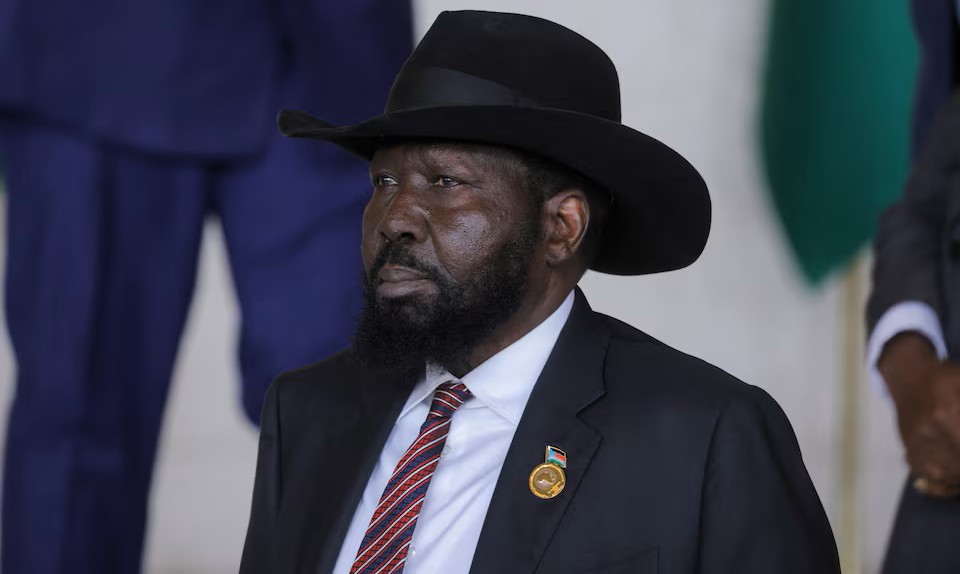
South Sudanese President Salva Kiir. Photo/Reuters
By Newsflash Team
South Sudanese President Salva Kiir has made two official visits to the United Arab Emirates this year, seeking urgent help as economic hardship deepens at home—highlighted by the growing crisis of unpaid civil servants who have gone months without salaries.
The trips reflect a desperate push by Kiir’s administration to address mounting financial and political challenges. The UAE, which is expanding its influence across the Horn of Africa, appears to be one of the few potential partners Kiir is turning to for economic relief and diplomatic leverage.
Kiir departed Juba on June 22 and returned only this week, on Tuesday. While officials described the trip as a mission to “promote investment and enhance bilateral relations,” the extended absence underscores the gravity of the situation back home. In both the February and June visits, Kiir’s government said the President would pitch opportunities in infrastructure, energy, agriculture, and the broader economy.
Ahead of the recent trip, Presidential Spokesperson David Amuor Majur told reporters that Kiir planned to meet investors and present “a compelling case for investment” in South Sudan’s key sectors. Abu Dhabi, however, did not confirm whether any agreements were reached. Juba has claimed it is working to streamline regulations to attract foreign capital.
Salaries unpaid as economy buckles
The primary urgency behind Kiir’s diplomacy, however, lies in South Sudan’s worsening economic conditions. The government has failed to pay public workers for several months, with some civil servants reportedly turning to courts in Nairobi to seek compensation. The economic strain is compounded by conflict in neighboring Sudan, which has sent nearly 200,000 refugees into South Sudan and further burdened public resources.
Read more:UN calls for dialogue in South Sudan
While Sudan’s military junta has cut diplomatic ties with the UAE, South Sudan has maintained open communication, acting as an intermediary. This position has given Juba new diplomatic relevance. In March, the UAE opened the 100-bed Madhol Field Hospital in Northern Bahr el Ghazal, aimed at supporting around two million people, mostly displaced by the Sudan war. Abu Dhabi also pledged $200 million in humanitarian aid at a donor conference.
Still, these gestures have not relieved Juba’s economic strain. Oil, South Sudan’s lifeblood and source of 98 percent of its revenue, has faced major disruptions. The war in Sudan affected pipeline operations, halting exports for months. Even before that, much of South Sudan’s production—about 150,000 barrels per day—had been pre-sold through 2026, limiting short-term revenue options.
Confusion over oil deals
In May, government spokesperson Martin Lomuro dismissed claims that South Sudan had signed a $13 billion oil-backed loan with the UAE-based Hamad bin Khalifa Department of Projects, a private company. However, he admitted the country was actively pursuing similar arrangements. South Sudan’s over-reliance on oil, coupled with global price instability and transport disruptions, has severely hurt the economy. The country is projected to lose 4.3 percent of its GDP in 2025, and annual inflation has soared to 143 percent.
The economic crisis has also derailed political reforms tied to the 2018 peace agreement. According to the Reconstituted Joint Monitoring and Evaluation Commission (R-JMEC), which monitors implementation, most reform milestones have been missed or stalled entirely.
Poverty rises
The African Development Bank (AfDB) painted a bleak picture in its “South Sudan Country Focus 2025” report, released in Juba on June 25. The report noted that poverty levels have surged dramatically, with 92 percent of South Sudan’s 16 million citizens now living on less than two dollars a day. In 2011, when the country gained independence, the rate was 51 percent. It rose to 82 percent in 2022, 84 percent in 2023, and 92 percent in 2024. The conflict’s toll on oil output and basic services has eroded nearly all development progress.
Read more: UN calls for dialogue in South Sudan
Still, there is cautious optimism. After the February repair of a key oil pipeline damaged during the Sudan war, South Sudan resumed oil exports. The International Monetary Fund (IMF) has since stepped in, announcing last month that its staff had reached a deal with South Sudan on a nine-month Staff-Monitored Programme (SMP) beginning in August 2025.
The SMP will guide economic and governance reforms, aiming to boost resilience, stabilize macroeconomic conditions, and enhance transparency. For Kiir’s government, it’s a chance to restore confidence and perhaps resume salary payments.
But for now, as civil servants endure unpaid months and the population struggles with extreme poverty, the pressure is mounting on Juba to turn diplomatic overtures into tangible relief.



